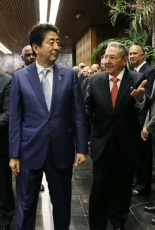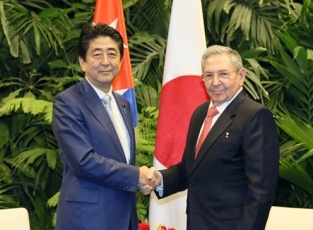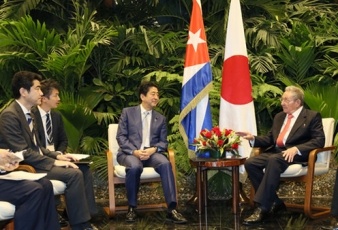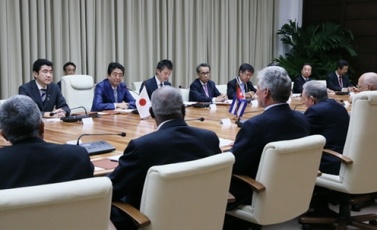Japan-Cuba Relations
Japan-Cuba Summit Meeting
September 23, 2016
 Photo: Cabinet Public Relations Office
Photo: Cabinet Public Relations Office
 Photo: Cabinet Public Relations Office
Photo: Cabinet Public Relations Office
 Photo: Cabinet Public Relations Office
Photo: Cabinet Public Relations Office
The Prime Minister of Japan, Mr. Shinzo Abe had a meeting with the President of the Council of State of Cuba, Mr. Raúl Castro on September 22nd for more than 2 hours in the Council of State in Havana. This visit is the first visit to Cuba by a Japanese Prime Minister in office.
 Photo: Cabinet Public Relations Office
Photo: Cabinet Public Relations Office
 Photo: Cabinet Public Relations Office
Photo: Cabinet Public Relations Office
- At the outset, welcoming the visit of Prime Minister Abe to Cuba, President Raúl Castro recalled that Japan used to be the second largest trading partner of Cuba in the 70s and 80s, and stated that Japanese products fabricated back then are still in use, lauding, in this regard, the high standard of the Japanese technologies.
- Prime Minister Abe expressed his satisfaction over his visit to Cuba as the first Japanese Prime Minister to do so and his first meeting with President Raúl Castro. He also expressed his determination to work with President Castro with a view to marking a new chapter in the long history of friendship between the two nations, which originated from the arrival to Cuba of the samurai Hasekura Tsunenaga.
- Prime Minister Abe proposed that Foreign Ministers of both countries hold a meeting, whenever possible, to strengthen the ties and accelerate cooperation between Japan and Cuba, one of the most influential countries of the Non-Aligned Movement (NAM) and of the international community.
- Prime Minister Abe stated that Japanese companies, keen on working for further development of Cuba, will surely be reliable partners for the modernization of Cuban society and economy, and stressed the need for both Governments to support further progress of bilateral economic relations.
- Prime Minister Abe announced that Japan will resume partially the underwriting of overseas investment insurance for Cuba, and will hold, together with Cuba, the Second Joint Public-Private Committee Meeting at the political level in November. He also stated that the Public-Private Conference for Infrastructure will be held next February to promote further understanding of "investment in high quality infrastructure" and to support activities of Japanese infrastructure firms in Cuba. He expressed his expectation for President Raúl Castro's leadership in improving investment environment.
- Prime Minister Abe welcomed the signing of notes for debt relief measures for Cuba and asked cooperation of President Raúl Castro for steady repayment. He also expressed his satisfaction for the exchange of notes for grant aid (to purchase medical equipment), welcomed the commencement of a survey with a view to establishing the Cuba-Japan Medical Centre, and expressed his will to pursue synergy between Japanese and Cuban medical expertise. He further stated that Japan wishes to contribute to improving Cuba's balance of payments by implementing further grant aid. Mr. Abe announced that Japan will establish a local office of JICA (Japan International Cooperation Agency) in Havana, with the aim of promoting further economic cooperation in a substantive manner.
- Prime Minister Abe expressed his satisfaction over the increasing number of Japanese tourists to Cuba, which had passed 10,000 last year, and announced that Japan will invite more than 100 young Cubans in the coming three years to encourage further exchange between the two peoples and to conduct capacity building for Cuban youth who are expected to contribute to the prosperity of Cuba. In addition, he expressed his wish to further deepen mutual understanding between the two peoples by dispatching a Japanese lecturer on baseball, a sport which is very popular in both countries, inviting gymnasts and coaches, concluding agreements for cooperation between the University of Havana and Japanese universities, and providing Japanese broadcasting contents.
- In the small group meeting, Prime Minister Abe explained Japan's view on the situation in Asia and asked understanding and cooperation of the President Castro on this matter. Both leaders also discussed their cooperation in international fora, concerning issues such as United Nations Security Council Reforms.

